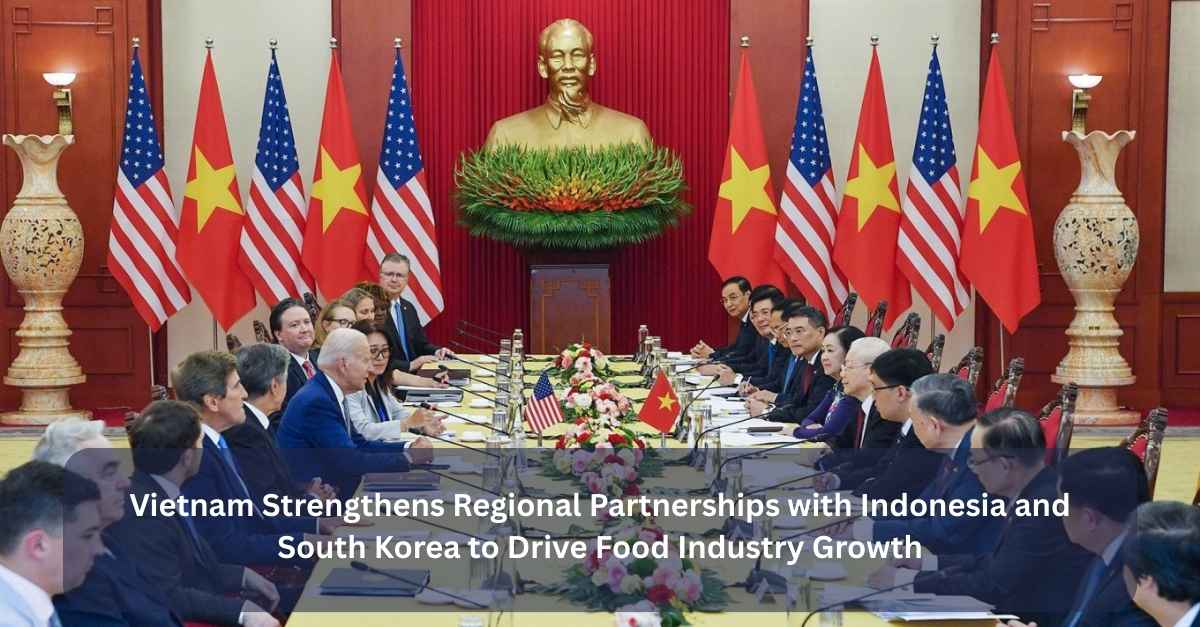On 11 August 2025, Vietnam and Indonesia set a big aim to grow trade to 18 billion USD by 2028, focusing on better food industry ties and ensuring long-term food security. This goal was reaffirmed during a recent food security cooperation forum in Vietnam, where both nations recognized their complementary strengths in agriculture sector. Vietnam, largest rice exporters, while Indonesia is a major producer of palm oil and coffee is advancing towards rice self-sufficiency. The country’s population add up to more than 370 million people, making up a big part of ASEAN’s cash flow. This shared scale and assortment create ground for collaboration in areas such as in fisheries industries, and innovative agricultural science.
Trade among Vietnam and Indonesia hit 16.7 billion USD in 2024, and kept up the pace in 2025. Rice, coffee, fruits, vegetables, tea, and seafood have all showed significant growth Vietnamese exports, reflecting the rising demand and complementary market needs. Rice sales went up more than 16% to 746 million USD, coffee by over 60%, and water products also grew a lot in double digits. On the flip side, Vietnam’s buys from Indonesia have included seafood, animal feed ingredients, and raw agricultural products that feed into Vietnam’s processing industries. This two-way exchange is not just about volumes it is about strengthening the resilience of both countries’ food systems.
Even with some progress, many issues remain. There are different food safety rules, complex Halal checks, high costs, small companies have less storage and can’t process much, weather problems, and poor logistics, all block better trade. To fix these, leaders and business folks want both sides to agree on Halal and food rules, make paperwork easy, and use new tech like blockchain technology and internet of things to track and see supply chains better. Reinforcing logistics connectivity, especially between Vietnam’s Cai Mep–Thi Vai port and major Indonesian ports, is also seen as vital step to enhancing trade smoothly. If these steps are executed effectively, the food industry will benefit from faster shipment times, reduced losses, and improved quality control from industry to consumer.
At the same time, Vietnam is getting closer to South Korea. On a recent visit, they agreed to boost their big partnership. They want to grow their economy together, make supply chains stronger, and push for new tech. They aim to get their trade to 150 billion USD by 2030, while ensuring balance and sustainability in trade flows. For Vietnam’s food sector, this bigger tie with South Korea opens new ways to grow. South Korea’s know-how in smart farming, cold chains, exact farming, and food tech can help Vietnam get better and meet tough global market needs.
Vietnam is working with two partners to make its food industry better. One partner is in Southeast Asia and the other is in East Asia and this create a strong foundation for Vietnam to elevate its food industry. Collaboration with Indonesia can fixed stable sources of agricultural products, open new export opportunities, and enable the development of shared food security strategies for the region. Meanwhile, partnership with South Korea can bring in advanced technologies, investment capital, and modern infrastructure that enhance efficiency, sustainability, and quality in production and distribution.
In the bigger picture of ASEAN, Vietnam’s two-way plan sets it up as both a path and a key spot in the region’s food supply chains. By joining hands with Indonesia to make trade within ASEAN better and with South Korea to link into advanced manufacturing and processing systems. Vietnam can serve as a central point where raw agricultural materials are transformed into higher-value products for export. This not only boosts export earnings but also creates jobs, encourages rural development, and strengthens Vietnam’s role in ensuring regional food security.
In times to come, the converging ties are expected to enable Vietnam in growing its export footprint at the global level and moving upward in the food industry value chain. By blending the traditional agricultural strengths with modern processing, branding, and quality assurance systems, Vietnam can compete more effectively in premium markets and immediately react to changing consumer preferences. Furthermore, through investment in sustainable farming and climate-resilient supply chains, Vietnam can project itself as a responsible and forward-looking player in the global food economy. If this momentum is maintained and adequately supported with consistent policy backing, Vietnam could well be at the fore as Asia’s portal for high-quality, trusted, and innovative food products.











